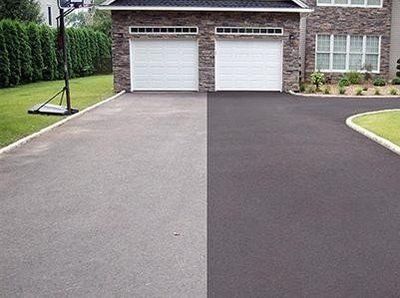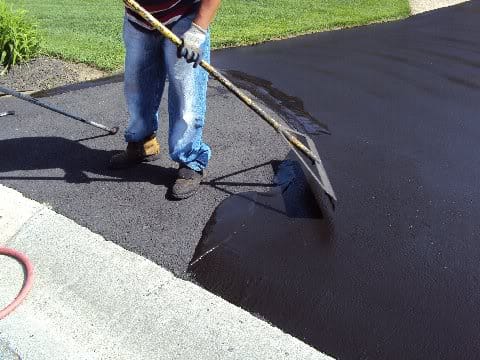Safeguard Surface Areas with Expert Asphalt Sealing: Cold Mix Fundamentals
Safeguard Surface Areas with Expert Asphalt Sealing: Cold Mix Fundamentals
Blog Article
Cold Mix Asphalt Vs. Hot Mix Asphalt: Which Is Right for You?

Structure Distinctions
Cold mix and warm mix asphalts vary substantially in their make-up, with distinct attributes that impact their performance and applications. Cold mix asphalt is generated by emulsifying the asphalt binder with water and an emulsifying agent prior to blending it with aggregate. This method enables the asphalt to be workable at lower temperature levels, making it perfect for short-lived repair work and for usage in cooler weather. Warm mix asphalt, on the other hand, is manufactured at heats, typically between 300-350 ° F, which aids to achieve much better compaction and a much more sturdy end product. The hot mix asphalt production process includes heating up the accumulation and asphalt binder individually prior to incorporating them at the asphalt plant.
Moreover, cool mix asphalt tends to be less thick and extra versatile than hot mix asphalt. This flexibility makes it far better suited for areas with higher levels of activity, such as driveways or roadways with rush hour. On the other hand, warm mix asphalt is known for its high durability and resistance to rutting and cracking, making it a recommended selection for highways and high-traffic roads where long life is essential.
Installment Process Differences
The process of setting up cool mix and hot mix asphalt displays notable variations in their treatments and requirements. In comparison, hot mix asphalt requires an extra elaborate setup procedure. Due to the home heating needs, hot mix asphalt installations are commonly carried out by professionals with specific tools, making certain a more long-term and structurally audio outcome.
Resilience and Durability Aspects
When taking into consideration asphalt alternatives, durability and longevity are essential elements to assess for long lasting pavement performance,. Hot mix asphalt (HMA) is recognized for its exceptional longevity and durability. The heats during the laying and blending procedure enable much better compaction, leading to a denser and stronger sidewalk framework. This causes HMA being much more resistant to hefty website traffic tons, severe weather conditions, and the results old compared to cold mix asphalt (CMA)
In terms of hop over to here durability, HMA usually surpasses CMA as a result of its remarkable strength and resistance homes. HMA pavements have a longer life span, requiring much less frequent repair services and maintenance, which can equate to cost financial savings over time. Furthermore, HMA pavements are a lot more conveniently adjustable to fulfill certain project demands, further improving their durability.
Expense Factors To Consider
Thinking about the monetary ramifications is a vital facet when examining the selection in between warm mix asphalt (HMA) and chilly mix asphalt (CMA) for pavement projects. While the initial cost of warm mix asphalt is typically greater than that of cool mix asphalt, HMA usually gives an extra economical option in the long run due to its visit our website exceptional sturdiness and durability.
In addition to material prices, it's vital to take into consideration the costs linked with installation and upkeep when comparing HMA and CMA. Eventually, the choice between HMA and CMA must take into account not just the first cost yet also the long-lasting economic implications to figure out the most cost-efficient option for the details pavement project.
Environmental Effect Contrast
Comparison of the environmental influences between hot mix asphalt (HMA) and cool mix asphalt (CMA) discloses distinct distinctions in sustainability techniques. HMA manufacturing needs heats, causing raised energy consumption and greenhouse gas discharges. The procedure likewise releases unstable natural substances (VOCs) and unsafe air pollutants (HAPs) into the atmosphere. In contrast, CMA is created and used at reduced temperature levels, lowering power use and emissions considerably. The lower production temperatures of CMA lead to reduced gas usage and reduced degrees of CO2 discharges, making it a much more eco-friendly alternative.
Furthermore, using CMA typically includes recycling existing asphalt pavement, advertising source conservation and decreasing the amount of waste sent out to land fills. This recycling aspect further boosts the sustainability of CMA contrasted to HMA. Generally, when thinking about the environmental influence, CMA becomes a much more environmentally lasting selection due to its reduced power requirements, reduced exhausts, and the possibility for recycling existing products. By choosing CMA over HMA, road building jobs can add favorably to ecological conservation initiatives.
Verdict
Finally, the option in between cold mix asphalt (CMA) and warm mix asphalt (HMA) relies on various aspects such as make-up, installation process, durability, durability, price, and ecological impact. asphalt patch repair. While CMA supplies a quick and affordable service for minor repair services, HMA makes certain superior sturdiness and long life for rush hour areas. Think about these variables carefully to determine which type of asphalt is the best option for your paving requires

Taking into consideration the monetary implications is a critical aspect when reviewing the choice between warm mix asphalt (HMA) and cool mix asphalt (CMA) for pavement jobs. While the first cost of warm mix asphalt is commonly higher than that of cold mix asphalt, HMA commonly provides a more economical remedy in the long run due to its exceptional toughness and long life. cold mix asphalt.Comparison of the ecological influences in between warm mix asphalt (HMA) and cool mix asphalt (CMA) reveals distinct differences in sustainability methods.In final thought, the selection in between cool mix asphalt (CMA) and warm mix asphalt (HMA) depends on various factors such as composition, setup process, sturdiness, durability, expense, and ecological effect
Report this page